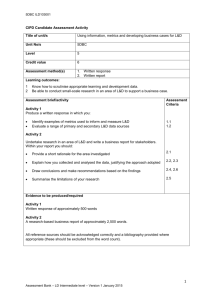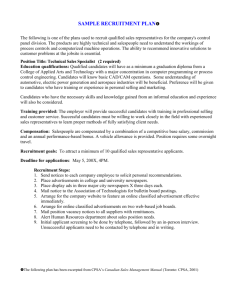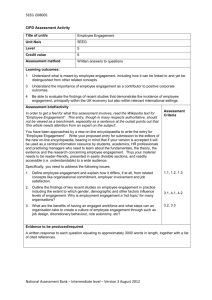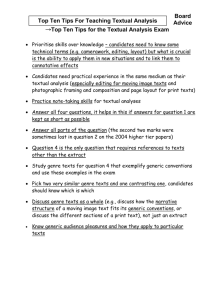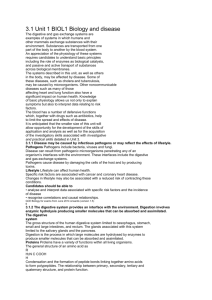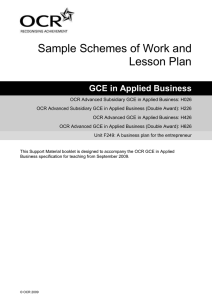Why Choose Media Studies
advertisement
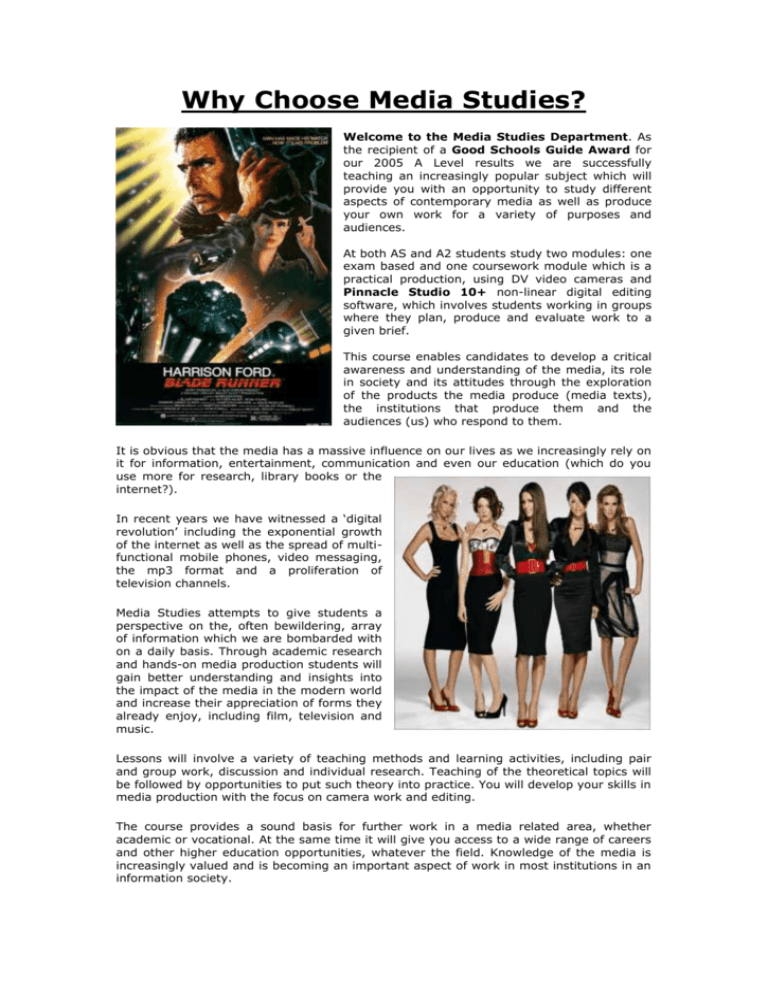
Why Choose Media Studies? Welcome to the Media Studies Department. As the recipient of a Good Schools Guide Award for our 2005 A Level results we are successfully teaching an increasingly popular subject which will provide you with an opportunity to study different aspects of contemporary media as well as produce your own work for a variety of purposes and audiences. At both AS and A2 students study two modules: one exam based and one coursework module which is a practical production, using DV video cameras and Pinnacle Studio 10+ non-linear digital editing software, which involves students working in groups where they plan, produce and evaluate work to a given brief. This course enables candidates to develop a critical awareness and understanding of the media, its role in society and its attitudes through the exploration of the products the media produce (media texts), the institutions that produce them and the audiences (us) who respond to them. It is obvious that the media has a massive influence on our lives as we increasingly rely on it for information, entertainment, communication and even our education (which do you use more for research, library books or the internet?). In recent years we have witnessed a ‘digital revolution’ including the exponential growth of the internet as well as the spread of multifunctional mobile phones, video messaging, the mp3 format and a proliferation of television channels. Media Studies attempts to give students a perspective on the, often bewildering, array of information which we are bombarded with on a daily basis. Through academic research and hands-on media production students will gain better understanding and insights into the impact of the media in the modern world and increase their appreciation of forms they already enjoy, including film, television and music. Lessons will involve a variety of teaching methods and learning activities, including pair and group work, discussion and individual research. Teaching of the theoretical topics will be followed by opportunities to put such theory into practice. You will develop your skills in media production with the focus on camera work and editing. The course provides a sound basis for further work in a media related area, whether academic or vocational. At the same time it will give you access to a wide range of careers and other higher education opportunities, whatever the field. Knowledge of the media is increasingly valued and is becoming an important aspect of work in most institutions in an information society. Advanced/Advanced Subsidiary OCR GCE Media Studies Assessment is by means of two units of assessment for AS and a further two units of assessment for Advanced GCE. AS G331 – Foundation Production This unit requires candidates to demonstrate a range of technical skills and understanding of media texts trough the construction of a media text of their own production. Candidates also record and monitor the production process and demonstrate evaluation, from planning to outcome. Preliminary exercise: Continuity task involving filming and editing a character opening a door, crossing a room and sitting down in a chair opposite another character, with whom she/he then exchanges a couple of lines of dialogue. This task should demonstrate match on action, shot/reverse shot and the 180-degree rule. Main task: the titles and opening of a new fiction film, to last a maximum of two minutes. Your AS Production Brief is to produce the opening two minutes of a thriller including titles. AS G332 - Textual Analysis The purpose of these units is first to assess candidates’ media textual analysis skills and their understanding of the concept of representation using a short unseen moving image extract from television drama. Second to assess candidates’ knowledge and understanding of media institutions and their production processes, distribution strategies, use of technologies and related issues concerning audience reception and consumption of media texts. The examination is two hours (including 30 minutes for viewing and making notes on the moving image extract) and candidates are required to answer two compulsory questions. The unit is marked out of a total of 100, with each question marked out of 50. There are two sections to this paper: Section A: Textual Analysis and Representation (50 marks) Section B: Institutions and Audiences (50 marks) At Advanced GCE, candidates have the opportunity to extend their knowledge within the conceptual framework through engagement with a range of contemporary media issues and debates and and through completion of an advanced coursework production. A2 G323: Advanced Portfolio This is a coursework unit where candidates will produce a media portfolio and a presentation of their research, planning and evaluation. A2 G324: Critical Perspectives This is a synoptic question paper which has two sections: Section A: Candidates are required to answer one question on Theoretical Evaluation of Production. Section B: Candidates answer one question from a choice of six from Contemporary Media Issues. To find out more about the course visit the school’s website at http://www.brgs.org.uk curriculum area or the find information from the exam board at http://www.ocr.org.uk



